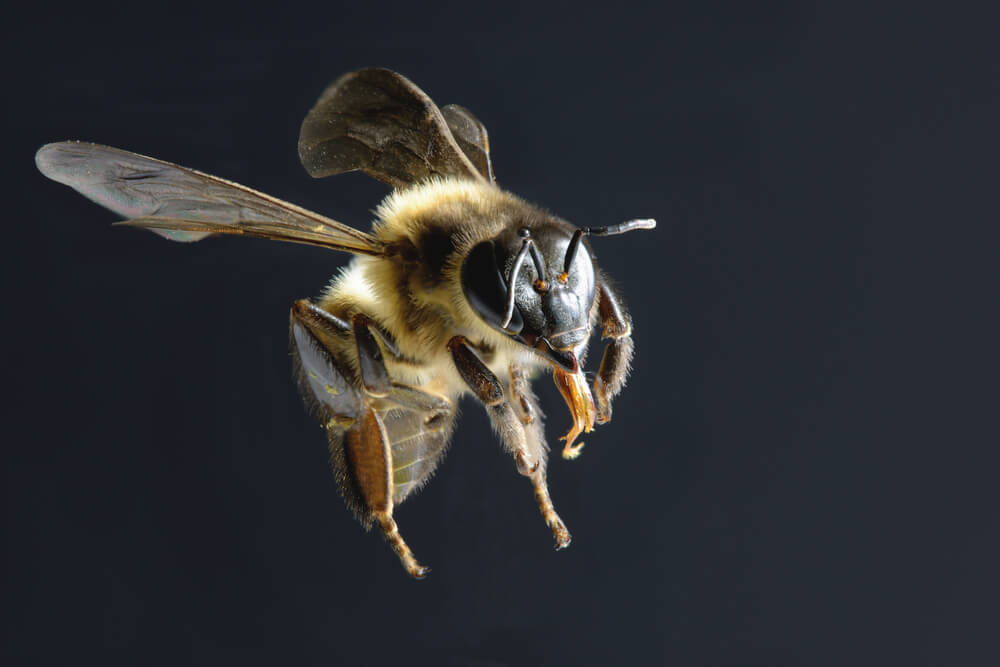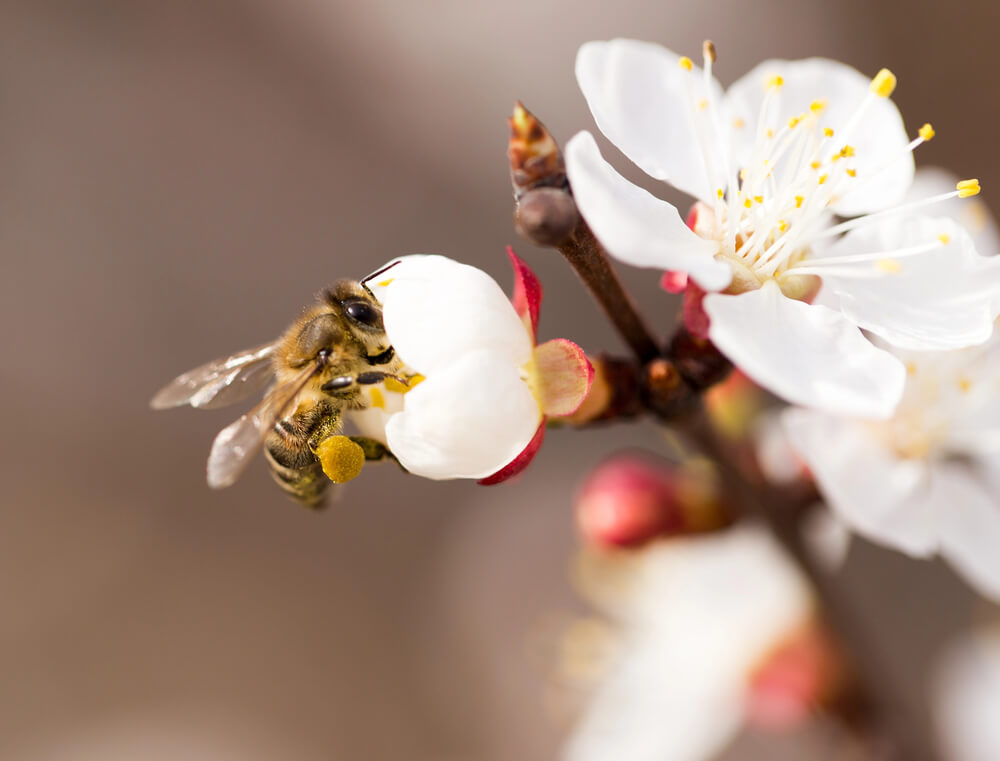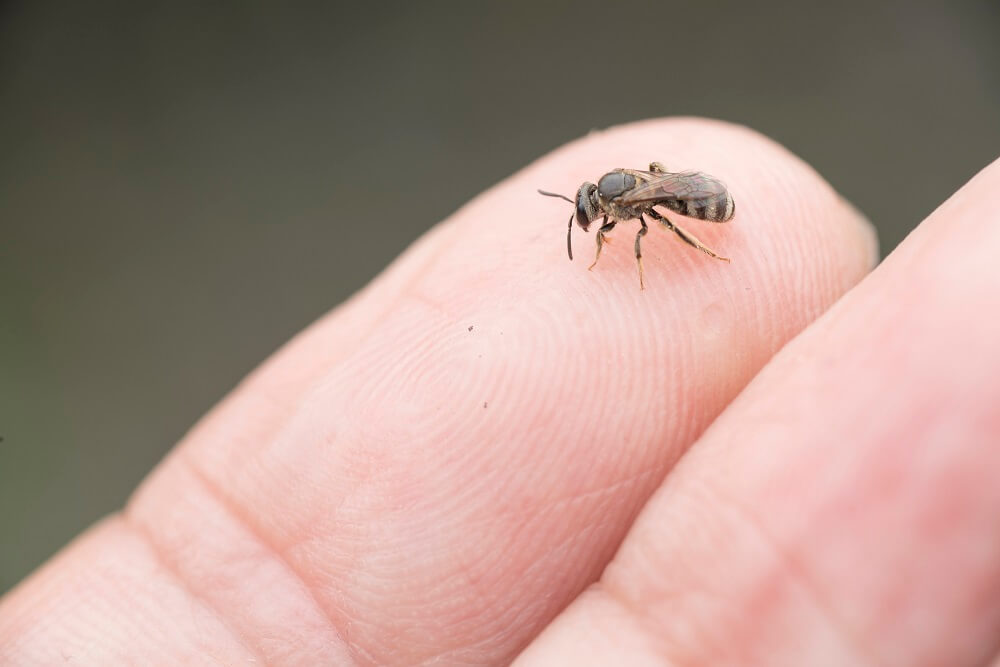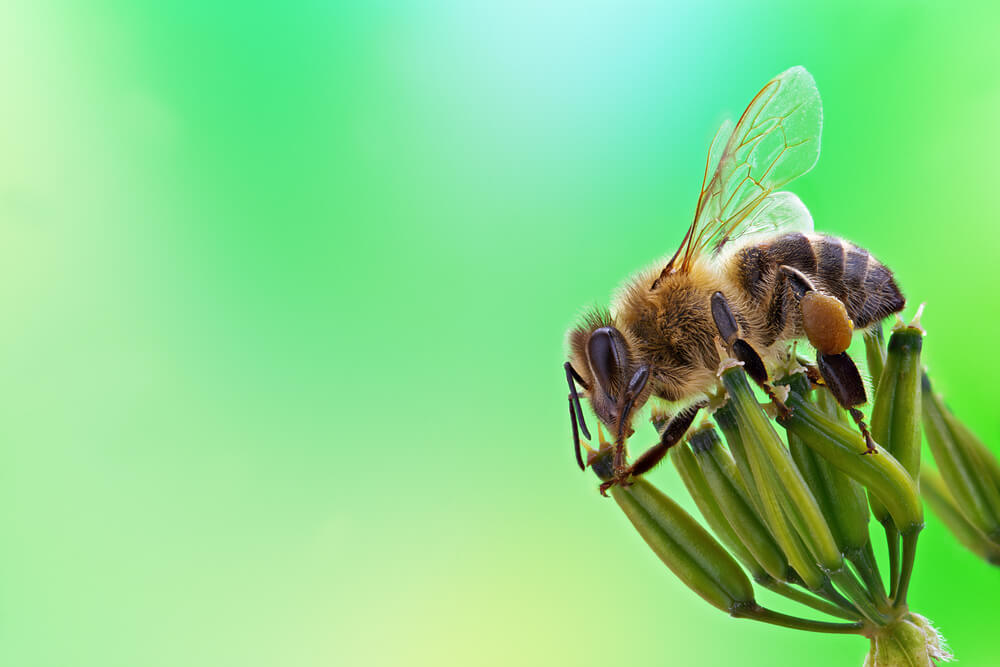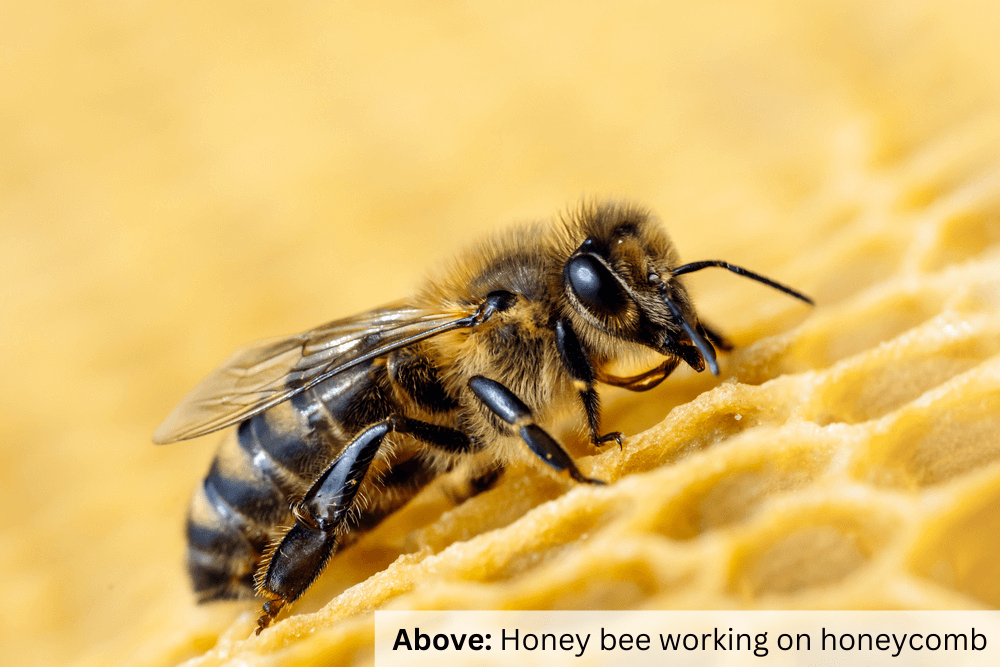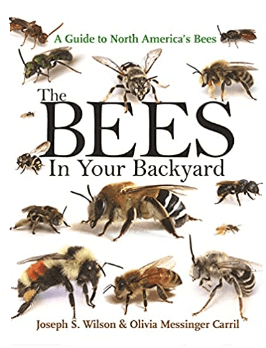Table of Contents:
Do Bees Fly in the Dark?
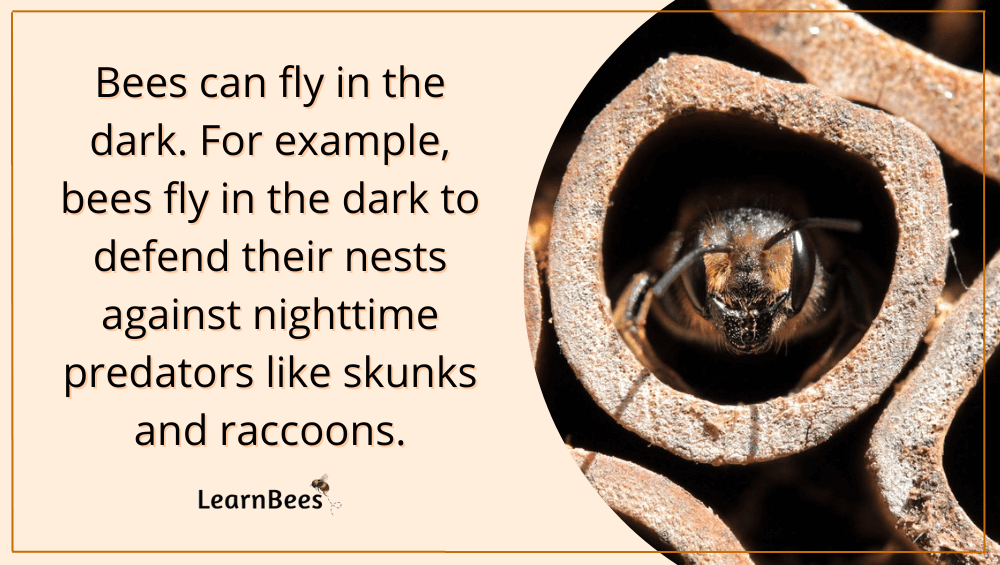
Despite popular belief:
Bees can fly in the dark.
In fact, there are entire bee species that only fly at night. These nocturnal bees collect pollen and nectar from night-blooming flowers like moonflowers (Ipomoea alba).(1)
For example, the Indian carpenter bee is a species that regularly flies in the dark, even on the darkest moonless nights.(2)
With that said:
A viral video surfaced earlier this year showing bees suddenly dropping to the ground once artificial lights were turned off. This video garnered millions of views and led to click-bait headlines such as, “Honeybees and Bumblebees Cannot Fly at Night.”
The truth, though?
Bees can – and often do – fly at night. For example, honeybees will fly in the dark to attack night predators like skunks, raccoons, and bears who try to eat them or their honey. If you ask any beekeeper you know, they’ll also vouch for this.
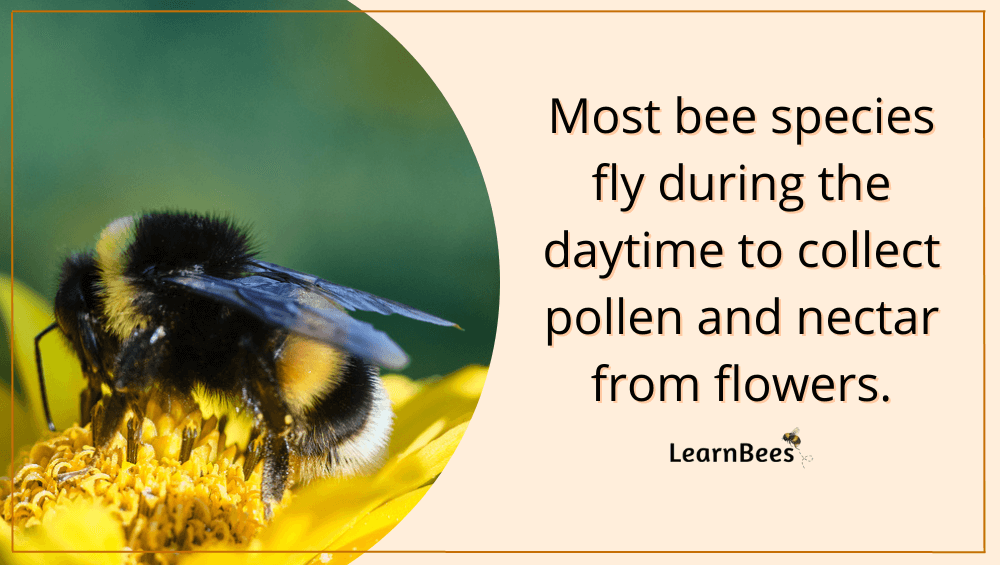
But now, don’t get me wrong:
This isn’t to say that bees do most of their flying at night.
Instead, bees usually only fly at night when necessary – such as to defend their nests. Most bees fly during the day to collect pollen and nectar from flowers. Nocturnal bees are the exception to this.
So now the question becomes:
Why did the bees in this video suddenly drop once the lights went out?
Tough to say.
The viral video gives us very little information on the bees themselves. For instance, what species of bees were they? What kind of experiments have they been subjected to? Heck, are they even bees?
Without more information and research, we can’t conclude why those bees dropped like that.
It’s possible that the bees were jolted by the sudden shift from light to dark. After all, that’s not something that happens in their natural environment.
Either way, I can tell you with confidence:
Bees can fly at night. Most bee species choose not to, but that doesn’t mean they can’t.
So that begs the question…
Where Do Bees Go At Night?
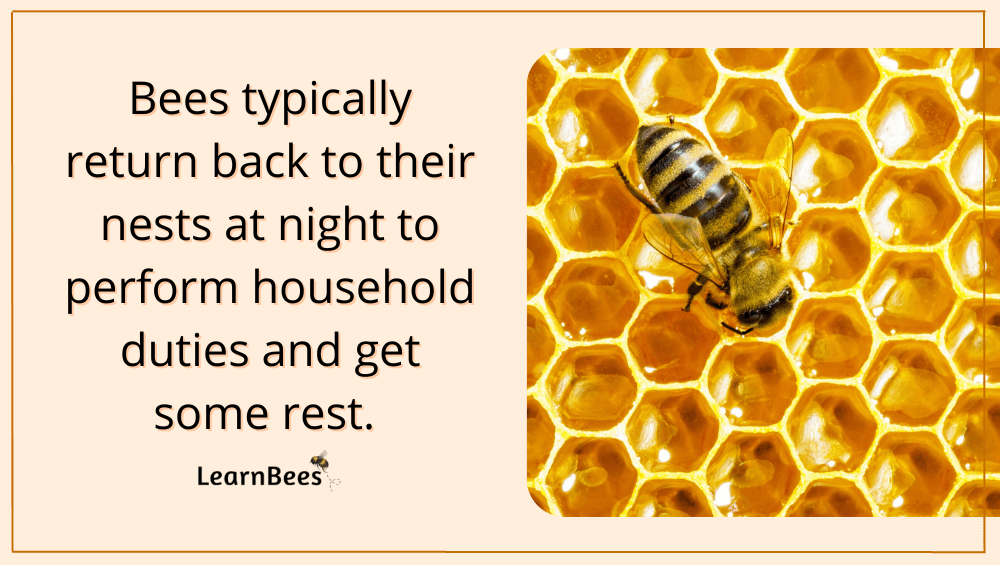
Most bees will go back to their nests at night.
From there, they’ll either sleep or do some work around the nest, including tending to baby bees and cleaning.
Social bees that live in hives will often “cluster” together in large groups near the hive entrance. This is known as bearding, and it allows the bees to keep cool during hot nights.
And here’s the thing:
Social bee species that live in groups, like bumblebees and honeybees, often do “shift” work at various times throughout the day and night.
For instance, some bees work mainly during the day while sleeping at night. These are often forager bees working outside the hive, collecting nectar and pollen for food.
Meanwhile, other bees will work inside the nest throughout the night and day, with short naps in between. These bees are house bees working inside the hive. They clean the nest, protect it, and tend to the baby bees.
Do Bees Sleep At Night?
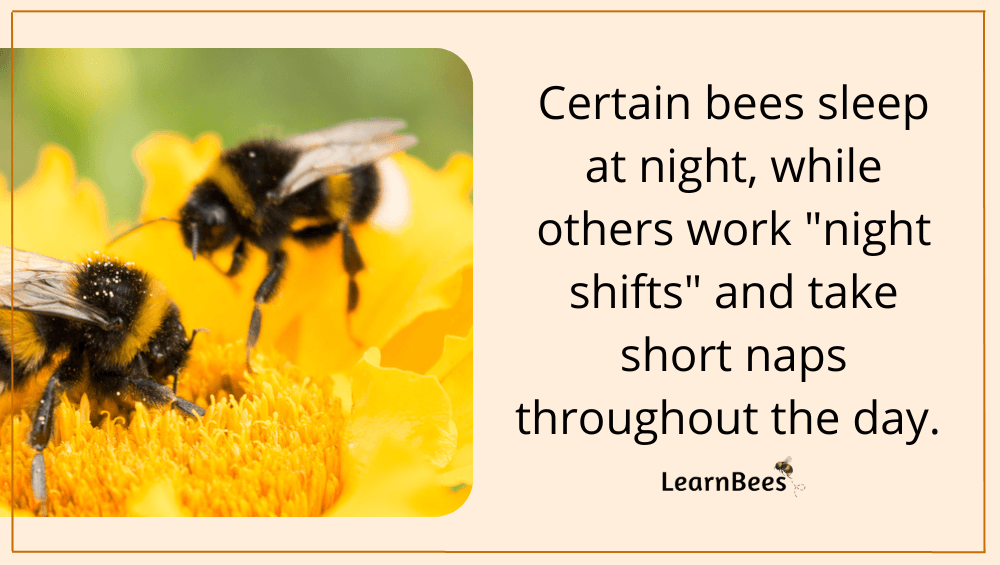
It depends.
In social bee colonies, some bees sleep at night while others are awake. Social bees often work in rotations, some working at night and others sleeping. It all depends on what their role in the colony is.
Solitary bees, on the other hand, do not live in groups or colonies. This means they don’t have co-workers to take shifts while they sleep.
Instead, solitary bees must choose when to rest and when to fly.
Many solitary bees will only fly during the day since flowers are open, and they can collect pollen and nectar. At night, these bees will go back to their nests and sleep. Some solitary bees include mason bees, leafcutter bees, and sweat bees.
FAQs on “Do Bees Fly in the Dark?”
- Do bees fall when there is no light?
- Can bees survive the night?
- Where do bees go to sleep at night?
- Why do bees fall out of the sky when it’s dark?
- Do bees swarm in the dark?
- Are bees aggressive at night?
- What time of day do bees go away?
- Do bees stay out all night?
- What attracts bees at night?
- How do I get rid of bees at night?
- Are bees alive at night?
- Can bees see in the dark?
- Do bees sleep at night?
- Do ground bees come out at night?
- Can I release a bee at night?
Do bees fall when there is no light?
No, bees can fly perfectly fine in the dark. There are several types of nocturnal bees, meaning they are active and fly at night.
With that in mind, most bees are diurnal, meaning they fly mostly during the day when they’re foraging for flowers. Such bees usually only fly at night when it’s time to protect their nest from night predators like bears, skunks, and raccoons.
For instance, bees will fly out of their hive after dark to sting animals trying to attack them or their honey.
That said, there is a misconception that bees fall when there is no light because of a viral video. This video shows bees dropping to the ground once an artificial light is turned off. However, there are so many questions surrounding that video, such as:
What type of bees were they? Were they even bees? What are their living conditions like?
Additionally, the bees may have dropped due to being jolted by the sudden change in light – which doesn’t happen in their natural environment. We simply don’t have all the answers because that viral video doesn’t provide many.
—> Go back to the FAQs on “Do Bees Fly in the Dark?”
More to Explore:
Can bees survive the night? Can bees fly at night?
Yes, bees survive the night. In fact, some types of bees are nocturnal and remain active during the nighttime. These bees feast on night-opening flowers, which allows them to collect food while not competing with daytime pollinators.
However, diurnal bees that are active during the day will often sleep at night inside their nests. This is especially true for honeybees and bumblebees, which live in large colonies with other bees.
Solitary bees, on the other hand, don’t live in groups or colonies. This means they have to choose when to rest and when to fly. Many solitary bees fly during the day when flowers are open to collect pollen and nectar.
At night, these bees will go back to their nests and rest. Some solitary bees include blue orchard bees, sweat bees, and leafcutter bees.
—> Go back to the FAQs on “Do Bees Fly in the Dark?”
More to Explore:
Where do bees go to sleep at night? What happens to bees at night?
People often ask, “Where do bees go after dark?” or “Can bees fly at night?”
Bees have different sleeping habits depending on what type of bee they are.
For example, social bees like honeybees often sleep inside their nests at random times during the day and night. This is because they live in large colonies with other bees and take shifts to ensure the hive is protected 24/7.
Some bees will work at night while others sleep, and vice versa. It all depends on what their role in the colony is.
Forager bees, for example, work during the day to gather pollen and nectar from blossoms. They’re active during the day and sleep at night.
House bees work inside the nest, protecting it, cleaning it, and taking care of the queen. They’re active during the day and night, taking short naps here and there.
Solitary bees, on the other hand, don’t live in groups or colonies. This means they don’t have co-workers to take shifts while they sleep. Instead, most solitary bees tend to be active during the day while resting at night.
—> Go back to the FAQs on “Do Bees Fly in the Dark?”
More to Explore:
Why do bees fall out of the sky when it’s dark?
Bees don’t fall out of the sky when it’s dark. This is a common myth based on a viral video, but there are so many questions surrounding that video. It doesn’t prove anything without more information, such as what was the bee species, their living conditions, etc.
The bees in the video may have dropped due to being jolted by the sudden change in light – which doesn’t happen in their natural environment.
—> Go back to the FAQs on “Do Bees Fly in the Dark?”
More to Explore:
Do bees swarm in the dark?
Bees can swarm in the dark. However, it’s more common for bees to start swarming during the day. They may remain in the swarm throughout the night until the scout bees find a new place for them to nest.
—> Go back to the FAQs on “Do Bees Fly in the Dark?”
More to Explore:
Are bees aggressive at night?
Bees can be defensive over their nest at any time of the day or night. They’re not unusually defensive simply because it’s nighttime.
With that in mind, bees often have to deal with many nighttime predators like raccoons and skunks. The bees will work together to protect themselves and their home if this happens.
—> Go back to the FAQs on “Do Bees Fly in the Dark?”
More to Explore:
What time of day do bees go away?
Most bees return to their nests in the evening as the sun starts to set. This is especially true for solitary bees, which don’t live in colonies or hives.
Social bees, like bumblebees, often remain active throughout the day and night. They live in large colonies with other bees, so there’s always someone awake to protect and work in the hive.
Additionally, social bee colonies require the help of many bees to keep the nest clean and take care of the larvae. For example, a queen honeybee can lay up to 2,000 eggs daily – that’s a lot of baby bees to look after.
—> Go back to the FAQs on “Do Bees Fly in the Dark?”
More to Explore:
Do bees stay out all night?
Most bee species fly back to their nests before nightfall. But, there are types of nocturnal bees that are active at night.
For example, the honeybee is diurnal, meaning it’s active during the day. However, a colony also has worker bees that will stay up all night to protect the hive from predators.
Some solitary bee species fly at night to avoid predators, extreme temperatures, and daytime competition from other bees. Such bees usually live in subtropical conditions.
—> Go back to the FAQs on “Do Bees Fly in the Dark?”
More to Explore:
- Ground Bees: Are They a Threat to Your Yard?
- Wasps vs. Honeybees: Are They Different?
- Do Bumble Bees Bite?
What attracts bees at night?
Most bee species aren’t active during the night, so there is very little you can do to attract them.
Some types of nocturnal bees might be spotted at night, but this is uncommon.
To attract bees during the day, ensure you have plenty of pollinator-friendly flowers like salvia, zinnia, and bee balm.
—> Go back to the FAQs on “Do Bees Fly in the Dark?”
More to Explore:
How do I get rid of bees at night?
You shouldn’t. Most bee species aren’t active at night. Instead, they’re typically back at their nest catching up on rest. You may be mistaking other insects for bees if you think you see a bunch of them flying around at night.
—> Go back to the FAQs on “Do Bees Fly in the Dark?”
More to Explore:
- Do Carpenter Bees Pollinate?
- How Long Do Bumble Bees Live?
- Honeybees vs. Bumblebees: How Do They Compare?
Are bees alive at night?
Yes, bees are alive and well at night. They become active the next day when the sun rises, and the weather warms the nest.
—> Go back to the FAQs on “Do Bees Fly in the Dark?”
More to Explore:
- Do Queen Bees Eat Honey?
- Are Worker Bees Male or Female?
- Queen Bee Versus Worker Bees – How Do They Compare?
Can bees see in the dark?
Yes, bees can see in the dark.
—> Go back to the FAQs on “Do Bees Fly in the Dark?”
More to Explore:
Do bees sleep at night?
Yes, bees often rest at night.
—> Go back to the FAQs on “Do Bees Fly in the Dark?”
More to Explore:
Do ground bees come out at night?
They usually don’t come out at night unless predators threaten them.
—> Go back to the FAQs on “Do Bees Fly in the Dark?”
More to Explore:
Can I release a bee at night?
It’s best to release a bee in the full sun during the morning. Preferably, release the bee next to flowers so it can refuel on nectar. Nectar provides bees with the carbohydrates needed for energy.
